

Muckraking and objectivity ... - Robert Miraldi. Just the Facts: How "Objectivity ... - David T. Z. Mindich. The Extreme Liberal Bias of Journalism Today. The objectivity norm in American journalism* Why did the occupational norm of ‘objectivity’ arise in American journalism?
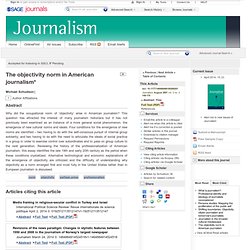
This question has attracted the interest of many journalism historians but it has not previously been examined as an instance of a more general social phenomenon, the emergence of new cultural norms and ideals. Four conditions for the emergence of new norms are identified – two having to do with the self-conscious pursuit of internal group solidarity; and two having to do with the need to articulate the ideals of social practice in a group in order to exercise control over subordinates and to pass on group culture to the next generation.
Reviewing the history of the professionalization of American journalism, this essay identifies the late 19th and early 20th century as the period when these conditions crystallized. Media Bias Basics. How Media Bias Is Revealed and What to Do About It - Big Journalism. Journalists Denying Liberal Bias, Part One. In spite of overwhelming evidence to the contrary, many journalists still refuse to acknowledge that most of the establishment media tilts to the left.
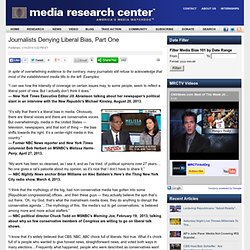
Examples: “I can see how the intensity of coverage on certain issues may, to some people, seem to reflect a liberal point of view. But I actually don’t think it does.”— New York Times Executive Editor Jill Abramson talking about her newspaper’s political slant in an interview with the New Republic’s Michael Kinsley, August 20, 2013. “It’s silly that there’s a liberal bias in media. Obviously, there are liberal voices and there are conservative voices. “My work has been so cleansed, as I see it, and as I’ve tried, of political opinions over 27 years....
“I know that it’s widely believed that CBS, NBC, ABC chock full of liberals. “Most of us, do not — you don’t know whether we’re Republicans or Democrats or exhibitionists.”— Co-host Barbara Walters on ABC’s The View, April 9, 2012. “As Mrs. The Myth of Objectivity in Journalism. By This page has been accessed since 29 May 1996.
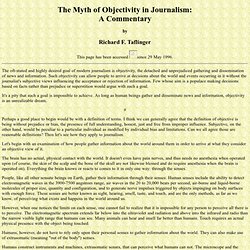
The oft-stated and highly desired goal of modern journalism is objectivity, the detached and unprejudiced gathering and dissemination of news and information. Such objectivity can allow people to arrive at decisions about the world and events occurring in it without the journalist's subjective views influencing the acceptance or rejection of information. Few whose aim is a populace making decisions based on facts rather than prejudice or superstition would argue with such a goal.
It's a pity that such a goal is impossible to achieve. Perhaps a good place to begin would be with a definition of terms. Let's begin with an examination of how people gather information about the world around them in order to arrive at what they consider an objective view of it. The brain has no actual, physical contact with the world. People, like all other sensate beings on Earth, gather their information through their senses.
Fear of bias can weaken journalism. An Argument Why Journalists Should Not Abandon Objectivity. In “Losing the News: The Future of the News that Feeds Democracy,” published by Oxford University Press, Alex S.
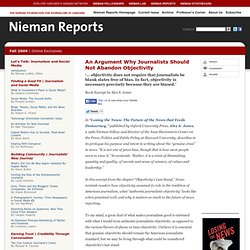
Jones, a 1982 Nieman Fellow and director of the Joan Shorenstein Center on the Press, Politics and Public Policy at Harvard University, describes in its prologue his purpose and intent in writing about the “genuine crisis” in news. SPJ Code of Ethics. SPJ Code of Ethics Revised September 6, 2014 at 4:49 p.m.
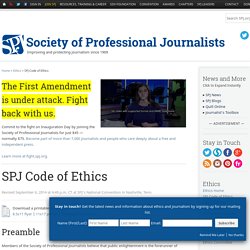
CT at SPJ’s National Convention in Nashville, Tenn. Download a printable copy [PDF]:8.5x11 flyer | 11x17 poster | Two-sided bookmark. Confirmation Bias in Conservative "Journalism" Objectivity, Professionalism, and Truth Seeking in Journalism : C.W. Anderson. Objectivity has changed – why hasn’t journalism? The following is cross-posted from a guest post I wrote for Wannabe Hacks.
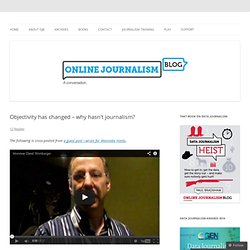
Objectivity is one of the key pillars of journalistic identity: it is one of the ways in which we identify ourselves as a profession. But for the past decade it has been subject to increasing criticism from those (and I include myself here) who suggest that sustaining the appearance of objectivity is unfeasible and unsustainable, and that transparency is a much more realistic aim. UNT talk-Objectivity in Journalism. University of North Texas Nature Writing Symposium talk: “Changing the World One Story at a Time” April 2007 Copyright © 2007 Wendee Holtcamp – bohemian@wendeeholtcamp.com Suppose you are given a bucket of water.
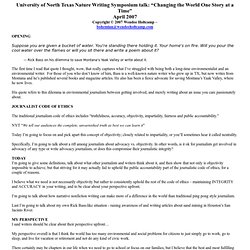
You're standing there holding it. -- Rick Bass on his dilemma to save Montana's Yaak Valley or write about it. The first time I read that quote I thought, wow, that really captures what I’ve struggled with being both a long-time environmentalist and an environmental writer. Rethinking Journalism Ethics, Objectivity in the Age of Social Media.
In response to the rapidly changing media environment, many schools and academic programs are offering novel approaches to journalism education.
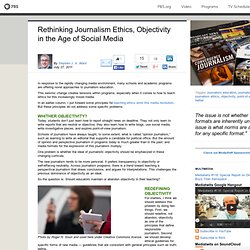
This seismic change creates tensions within programs, especially when it comes to how to teach ethics for this increasingly mixed media. In an earlier column, I put forward some principles for teaching ethics amid this media revolution. But these principles do not address some specific problems.